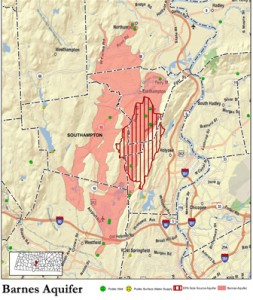EASTHAMPTON—Water contamination is continuing to be an issue for Westfield, which prompted a visit from the Massachusetts Department of Environmental Protection (MassDEP) yesterday.
MassDEP officials addressed the Barnes Aquifer Protection Advisory Committee (BAPAC) yesterday during their monthly Easthampton meeting to discuss the contamination issues of the Barnes aquifer and the relation to Barnes Regional Airport and the US National Guard. MassDEP was invited by the committee after the state organization sent a response letter to the National Guard over the investigation into groundwater contamination.
“Back in October, due to polyfluorinated carbons (PFCs) found in the water, we sent a letter to Barnes,” Eva Torr, deputy regional director of waste site cleanup for MassDEP, said. “We heard back from Barnes that they are going to investigate and take action on this, and we gave them 30 days to investigate private water sources, which they did not comply with.”
The National Guard has been suspected of being the source of PFCs—a group of compounds that includes perfluorooctanoic acid (PFOA) and perfluorooctanesulfonic acid (PFOS)—that have been found in the water supply of Westfield, though there has been no formal claim yet. The chemicals have been tied to a myriad of health issues according to MassDEP and Environmental Protection Agency (EPA), though Westfield water officials have been on record saying that there is no health impact at this time.
The chemical compounds are suspected to have come from firefighting foam that the Guard used from the 1950s to the 1980s, which has been on the airport grounds as recently as 2016. In addition to Barnes, there are several other sites across the U.S. that have had similar contamination issues related to the firefighting foam.
Torr said that after discussing the matter with the Guard over a period of time, MassDEP was not satisfied with the Guard’s slower than desired actions related to testing of private wells and investigating groundwater, so they sent them another letter on Dec. 21.
According to Torr, the letter said that if the Guard did not investigate then the state would do their own investigation. However, this would require state funds to do so, which is a route that is not desired. The Guard responded, saying that they would investigate and if they found a link to private wells, they would then take action.
Torr said that the department is still not satisfied with the response they received and they are currently looking into what the next step may be. In the meanwhile, she said that the National Guard should have the results of their own investigation within the next two weeks.
For the time being, Westfield has been conducting their own investigations and paying for projects associated with the contamination, BAPAC member and Westfield water systems engineer Heather Miller, said. To that point, Torr said that legal action may be the next most appropriate action for the city.
“I urge the city to look at legal means to recouping costs associated,” she said.
BAPAC officials were concerned about the possibility of contamination not just in Westfield, but also in neighboring communities due to the length of time that the foam was on site.
“Given time and toxicity we want to be consistent and get the potential extent of where it might have gone, so going into Holyoke to test is a good idea,” Dr. Robert Newton, committee member and professor of geosciences at Smith College, said.
Torr said that MassDEP would continue to be in contact with BAPAC on the status of the investigation.



